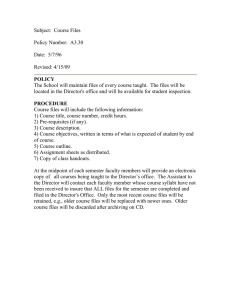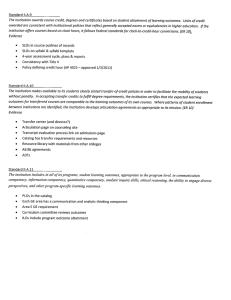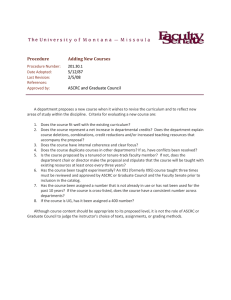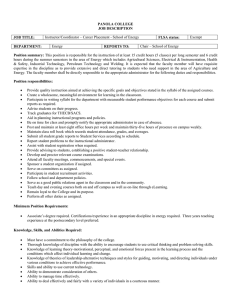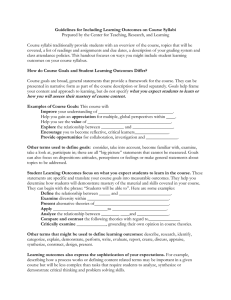Tips for Incorporating Competencies
advertisement
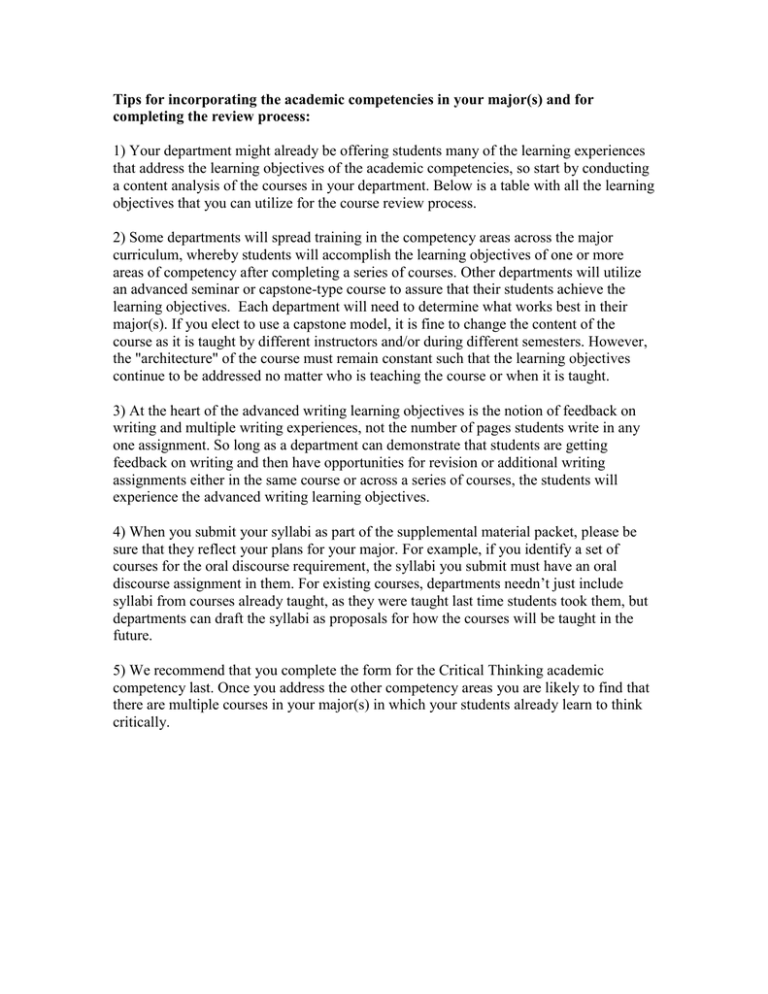
Tips for incorporating the academic competencies in your major(s) and for completing the review process: 1) Your department might already be offering students many of the learning experiences that address the learning objectives of the academic competencies, so start by conducting a content analysis of the courses in your department. Below is a table with all the learning objectives that you can utilize for the course review process. 2) Some departments will spread training in the competency areas across the major curriculum, whereby students will accomplish the learning objectives of one or more areas of competency after completing a series of courses. Other departments will utilize an advanced seminar or capstone-type course to assure that their students achieve the learning objectives. Each department will need to determine what works best in their major(s). If you elect to use a capstone model, it is fine to change the content of the course as it is taught by different instructors and/or during different semesters. However, the "architecture" of the course must remain constant such that the learning objectives continue to be addressed no matter who is teaching the course or when it is taught. 3) At the heart of the advanced writing learning objectives is the notion of feedback on writing and multiple writing experiences, not the number of pages students write in any one assignment. So long as a department can demonstrate that students are getting feedback on writing and then have opportunities for revision or additional writing assignments either in the same course or across a series of courses, the students will experience the advanced writing learning objectives. 4) When you submit your syllabi as part of the supplemental material packet, please be sure that they reflect your plans for your major. For example, if you identify a set of courses for the oral discourse requirement, the syllabi you submit must have an oral discourse assignment in them. For existing courses, departments needn’t just include syllabi from courses already taught, as they were taught last time students took them, but departments can draft the syllabi as proposals for how the courses will be taught in the future. 5) We recommend that you complete the form for the Critical Thinking academic competency last. Once you address the other competency areas you are likely to find that there are multiple courses in your major(s) in which your students already learn to think critically. Learning Objectives Table Oral Discourse 1. communicate ideas effectively appropriate to a specific context and according to a specific set of criteria 2. establish and maintain an appropriate performer/audience relationship in a given oral exercise, and actively engage with listeners/audience 3. respond to, and where appropriate, incorporate listener’s comments and questions 4. evaluate, orally or in writing, an oral performance 5. regularly practice communication skills through questions, discussions, debates and/or presentations (both formal and informal) Information Literacy 1. understand the information environment and information needs in the discipline in today’s society, including the organization of and access to information, and select the most appropriate strategies, search tools, and resources for each unique information need 2. demonstrate the ability to evaluate content, including dynamic, online content if appropriate 3. conduct ethical practices in the use of information, in ways that demonstrate awareness of issues of intellectual property and personal privacy in changing technology environments 4. produce, share, and evaluate information in a variety of participatory environments 5. integrate learning and research strategies with lifelong learning processes and personal, academic, and professional goals In what course(s) and how Critical Thinking 1. formulate complex questions, problems, and hypotheses clearly and precisely, and apply familiar and new concepts in developing solutions and conclusions 2. 2.gather and assess relevant information/data 3. test hypotheses against relevant criteria and standards, accounting for the facts 4. develop well-reasoned arguments and communicate them effectively to others 5. demonstrate habits of reflection upon their own and others’ thinking— identifying, analyzing, and evaluating their own and others’ arguments; and challenging conclusions with alternative explanations or points of view Advanced Writing in the Major 1. demonstrate increasingly sophisticated writing according to the conventions of their academic discipline 2. be able to communicate clearly in writing, employing fundamental rules of usage, style, and mechanics in the context of their discipline 3. be able to evaluate critically a variety of appropriate written texts, including their own 4. demonstrate the ability to incorporate critical feedback on their writing, coming to understand that revision and rewriting are an integral part of the writing process
